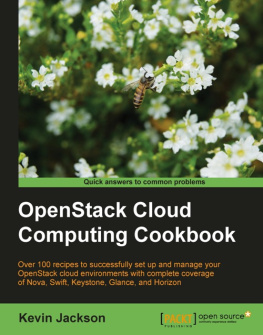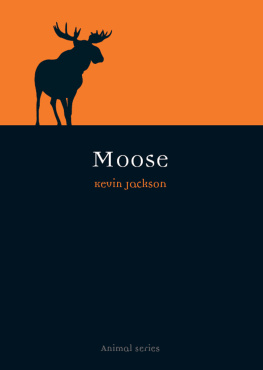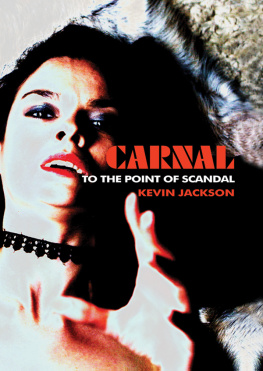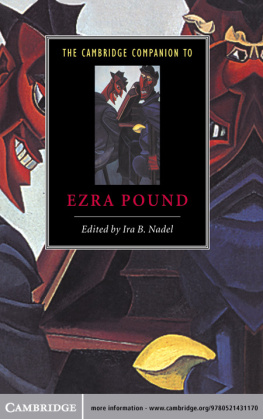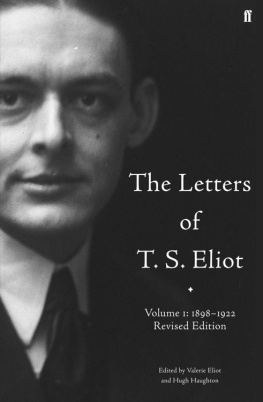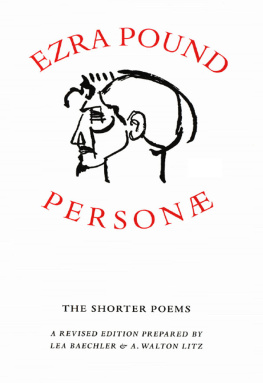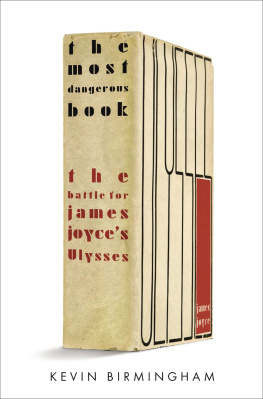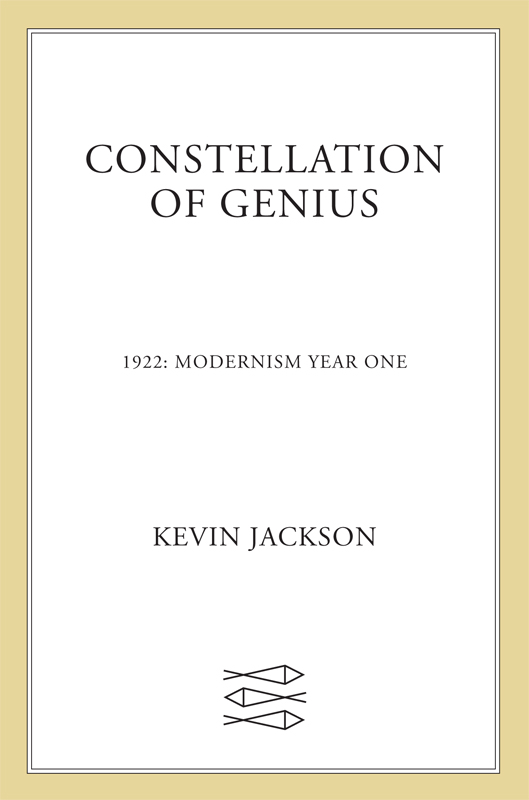
The author and publisher have provided this e-book to you for your personal use only. You may not make this e-book publicly available in any way. Copyright infringement is against the law. If you believe the copy of this e-book you are reading infringes on the authors copyright, please notify the publisher at: us.macmillanusa.com/piracy.
In memory of
Tom Lubbock
Il miglior fabbro
CONTENTS
ACKNOWLEDGEMENTS
My friends and colleagues Mark Booth, Jocasta Hamilton and Peter Straus all acted well above and beyond the call of duty to help see this book into the world. I am grateful beyond ready expression.
Of all my other friends, Ian Irvine was the most indefatigable supplier of information, rare texts, citations, wisdom and cerebral support during the years spent working on this book.
Gratias ago also to:
The late Gilbert Adair (RIP), Ian Alister, Pamela Allen, Mohit Bakaya, Jo Banham, Alastair Brotchie, Kate Bassett, John & Marie-Do Baxter, Tobias Beer, Anne Billson, Prof Simon Blackburn, Peter Blegvad, Jacqui Brocker, Kate Bolton, Jonathan Burt, Pete Carpenter, the Cuddon family, Richard Cohen, Prof Anne Dunan-Page, Hunt Emerson, Tig Finch, Francis FitzGibbon QC, Sir Christopher Frayling, Philip French, Alexander Fyjis-Walker, Spike Geilinger, Mark Godowski, Colin Grant, Richard Humphreys, Magnus Irvin, Robert Irwin, Dr Mary-Lou Jennings, Dr Glyn Johnson & Dr Evie Johnson, Philip Gwyn Jones, Gary Lachman, Shan Lancaster, Dr Anne Leone, Nick Lezard, Kevin Loader, the late Tom Lubbock (RIP), Kevin Macdonald, Rob Macfarlane, Fiona McLean, Roger Michell, Deborah Mills, Colin Minchin, Alan Moore, Kim Newman, Simon Nicholas, Charlie and Sally Nicholl, Holly ONeill, Prof Christopher Page, the Parsons family, Tanya Peixoto, David Perry, Mark Pilkington, Marzena Pogorzaly, Toby Poynder, the Preston family, Nick Rankin, Dr David Ricks and Dr Katy Ricks, Dr Stephen Romer, Martin Rowson, the Royal family, Prof Jonathan Sawday, Marcus Sedgwick, the Shepherd-Barron family, Iain Sinclair, Tom Sutcliffe, Dr Peter Swaab & Andrew MacDonald, Dr Bharat Tandon, David Thompson, Prof Martin Wallen, Prof Marina Warner, Lisa Williams, Clive Wilmer, Louise Woods, David & Linda Yates.
Without my wife, Claire: nada.
KJ
June 2012
INTRODUCTION
1922 AND ALL THAT
The American poet Ezra Pound referred to 1922 as Year One of a new era. In his view, the previous epoch the Christian Era, he called it had ended on October 1921 : the day, that is, when James Joyce wrote the final words of Ulysses . Pound suggested that all enlightened people should henceforth adopt his new calendar. For a while, he actually took to dating his letters p. s. U. post scriptum Ulixi . It was a short-lived habit. Later in Anno Domini 1922 , Benito Mussolinis fascists took control of Italy. They too initiated a new calendar; and Pound, an increasingly keen admirer of Mussolini, abandoned the Joycean time scheme and adopted the Italian one.
Had he been kidding about the era-slaying nature of Ulysses ? To some extent, yes. Still young enough in years he turned in 1922 and younger in spirit, Pound loved to tease and provoke; better still, to outrage. But his proposal that the world had somehow changed radically at or by the start of 1922 was not altogether a folly or so it came to seem, anyway, when scholars of later decades began to look back on those heady and unequalled days, and to assess their lasting significance. Long before the end of the twentieth century, it had become almost a commonplace that 1922 unquestionably was the annus mirabilis of literary modernism. It was the year that began with the publication of Ulysses, and ended with the publication of The Waste Land , by T. S. Eliot: the most influential English-language novel of the century, the most influential English-language poem of the century. Despite several revolutions in taste, these two works remain the twin towers at the beginning of modern literature; some would say of modernity itself.
To be sure, not everyone has gone along with the 1922 party line. There have been other candidates for the hypothetical moment of transition from pre-modern to modern the year 1910 , for example, as in Virginia Woolfs well-known declaration (in Mr Bennett and Mrs Brown, 1924 ): in or about December 1910 , human character changed. Another modern novelist, D. H. Lawrence, insisted that It was in 1915 that the old world ended. (He proposed that date in his Australian novel, Kangaroo , written in 1922 .) The pastime of calling an old world dead and a new one either freshly born or imminent was rather popular in the early decades of the twentieth century. Modern times, it has variously been asserted, began with the first performance of Jarrys Ubu Roi in 1896 (After us, the Savage God, wrote W. B. Yeats, who had witnessed that rowdy night); with Freuds Interpretation of Dreams in 1899 ; with Einsteins formulation of the Special Theory of Relativity in 1905 ; with Picassos Desmoiselles dAvignon in 1907 ; with Stravinskys The Rite of Spring in 1913 ; with the outbreak of World War I in 1914 (never such innocence again); or with the October Revolution of 1917 .
As this list implies, modern literature was notably lagging behind the other arts in the matter of experimentation. The successful prose writers of the day included the likes of Galsworthy, Bennett, and Kipling: masters of a plain, no-nonsense prose that aspired to the condition of complete self-effacement. Even H. G. Wells, who composed novels of ideas and scientific romance, wrote of strange futures in a good old-fashioned style. With the exception of a few wild souls promoted and recruited by Pound, poets mainly aspired to write in the Georgian manner short, formal, nostalgic verses steeped in the rural life of England. A. E. Housman was the living god of this tradition. English-language drama had just begun to catch up with Ibsen an early idol of Joyce but not yet with Strindberg or Jarry, and Shaws witty, well-carpentered plays were about the most daring confections that theatrical companies could tolerate.
Lets try to imagine the reactions of an unprepared, average reader of 1922 , content with his beer and skittles and his Kipling. Suddenly, enter a skinny, shabby Irishman and a natty, quietly sinister American, between them hell-bent on exploding everything that realistic fiction and Georgian poetry held dear. In Joyces novel, the old seductions of plot and character come a very poor second to a wild orgy of language. Far from being self-effacing, his prose is offered as a glory in its own right: wildly abstruse philosophical terms rub flanks with words from the pub and the brothel; the pages teem with parodies and pastiches of newspapers and legalese, religious catechisms and scientific reports, nursery rhymes and epic poems, soft porn and hard porn. Language has rebelled against the tyranny of subject matter and character, and become the leading character in its own right. The horror!
Worse still is Joyces insistence on portraying every aspect of quotidian life in unprecedented detail, including what happens in the lavatory and the marital bed though anyone flicking through its pages in search of spice is soon likely to be discouraged, either by the dauntingly high-flown quality of ruminations in the brain of Stephen Dedalus (a portrait of Joyce as he was in 1904 ) or by the maddeningly eccentric associative leaps in the brain of Leopold Bloom (the unlikely Ulysses character, a gentle middle-aged cuckold who by the end of the narrative will act the compassionate father to Stephen). Readers impatient to find the dirty words should go straight to the final chapter, a long night-time reverie, almost completely free of punctuation, by Blooms wife Molly. Plenty of sex there.


